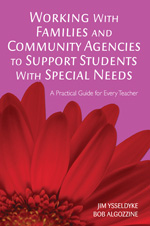Hands-on, Practical Guidance for Educators
From math,
literacy, science, equity, multilingual learners, and SEL, to assessment, school counseling,
and education leadership, our books are research-based and authored by experts
on topics most relevant to what educators are facing today.

Working With Families and Community Agencies to Support Students With Special Needs
A Practical Guide for Every Teacher
Discover the many valuable resources available to support students with special needs!
This informative resource explores the larger context of special needs students' lives outside school, and how life-stage issues and collaboration influence instruction. Including a pretest, posttest, and key vocabulary terms, it answers:
- What types of transition services are available?
- What should educators know about early-childhood intervention?
- What issues may arise when working with families?
- How can schools involve community organizations?
- What options are available to special needs students after high school?
- What program elements are critical to a student's success in the classroom and beyond?
Product Details
- Grade Level: PreK-12
- ISBN: 9781412938983
- Published By: Corwin
- Year: 2006
- Page Count: 120
- Publication date: March 31, 2014
Review Copies
This book is not available as a review copy.



